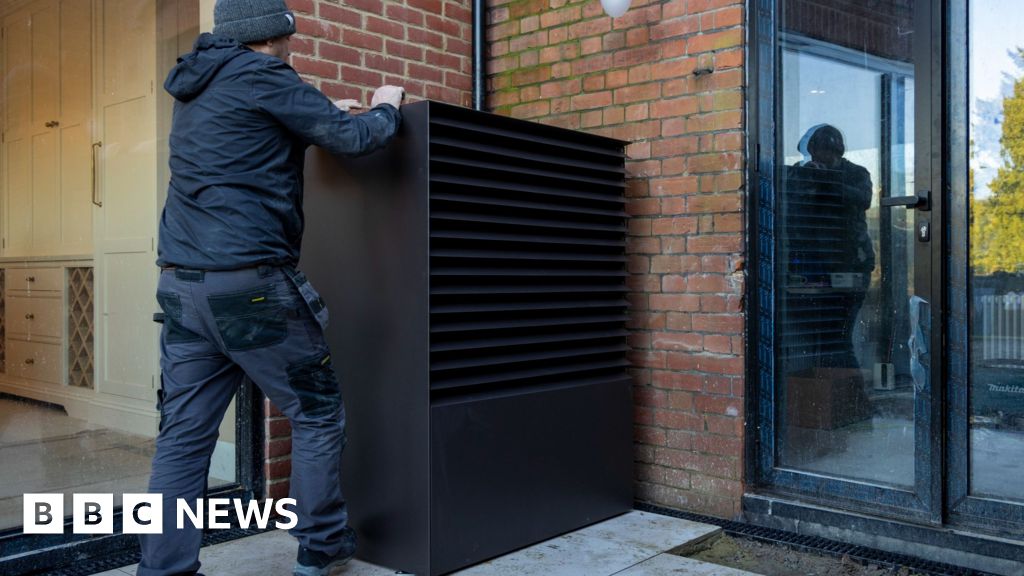UK homes install subsidised heat pumps at record level
- BBC News
The number of UK homes installing heat pumps supported by government-funded incentives rose to a record level last year.
Figures released on Thursday showed 52% more of the low-carbon heating systems were installed than in 2023.
Experts said part of the rise was due to an increase in the grant offered by the governments Boiler Upgrade Scheme (BUS) to persuade people to switch from gas boilers.
But the heat pump industry warned that running costs needed to fall for the government to hit its targets to install hundreds of thousands of the devices each year as part of its Net Zero plan to tackle climate change.
A Department for Energy Security and Net Zero spokesperson said: "The energy shocks of recent years have shown the urgent need to upgrade British homes and help more people benefit from homegrown energy.
"Thats why we have almost doubled the budget for the Boiler Upgrade Scheme to £295 million for the next financial year, and just launched a new campaign to help make more families aware of our offer of a £7,500 heat pump grant."
Most UK homes use gas boilers to meet their heating needs but gas is a fossil fuel that when burnt produces planet-warming gases.
With home heating accounting for 14% of the UKs carbon emissions, switching households from gas boilers to heat pumps is a key part of the governments climate pledges.
Heat pumps use electricity rather than gas, so as the country moves to generating electricity from renewable energy sources, like solar and wind, heat pumps will be responsible for far fewer planet-warming emissions than boilers.
About half of heat pumps currently being installed in the UK are supported by government funding - the remainder are made up of commercial installations and new builds which do not receive support.
One of the most popular government support mechanisms is the Boiler Upgrade Scheme, which provides a £7,500 grant to households to offset the cost of installation.
Ed Matthew, UK programme director for think tank E3G, said the decision by the previous government to increase the grant by 50% has had the biggest impact on the installation figures.
"It has been absolutely critical for making it affordable for households to buy this technology," he said.
In its first year, the scheme only spent a third of the funding allocated due to low public interest. But for 2024-2025 it is expected to overspend its budget.
Mr Matthews said it was critical that in the governments June spending review it recommits to the programme and provides greater funding for low-income households as the current costs - even with the grant - can be prohibitive.
"They do not want to take their foot off the brake here. If they suddenly start slashing the heat pump grant thats going to make the market crash," he said.
He also "strongly welcomed" the governments announcement on Thursday that it was launching a new communication campaign to build public understanding of heat pumps, which he hoped would combat misinformation about the technology.
Despite the progress, the total number of heat pump sales, including those not supported by government programmes, was just shy of 100,000 last year, according to the Heat Pump Association (HPA). This is significantly below the governments target of 600,000 a year by 2028.
But Charlotte Lee, chief executive of the HPA, remained positive because of future planning policy changes expected later this year.
"The future homes and building standards will see the market move. 200,000 homes are potentially being built every year, [and] the vast majority of those will be required to have a heat pump - it will absolutely create a gear change in the market," she said.
Madeleine Gabriel, head of sustainable mission at charity Nesta, agreed that changes to planning rules could also help to address the regional disparities in installation.
"The key thing is removing a rule that meant that you could only install a heat pump if you were more than one metre away from your property boundary, which made it difficult if youve got a small garden," she said.
This explains why dense urban areas, like London, has some of the lowest installation rates as a large share of people live in flats, she added.
Ms Gabriel and Mr Matthew agreed with the UK governments independent climate advisors, the UK Climate Change Committee (UKCCC), that the biggest barrier is the high price of electricity.
In a major report published last month, the UKCCC said that the cost of electricity could be brought down if the levies applied to electricity bills, to fund the cost of social and environment schemes, were removed or placed on gas bills.
"Once the consumer can save money [with heat pumps], I think it really changes the level of interest. Were moving from early adopters that think its the right thing to do to, actually, this is just a sensible financial investment choice," Ms Lee said.
Additional reporting by Justin Rowlatt.
Sign up for our Future Earth newsletter to get exclusive insight on the latest climate and environment news from the BBCs Climate Editor Justin Rowlatt, delivered to your inbox every week. Outside the UK? Sign up to our international newsletter here.